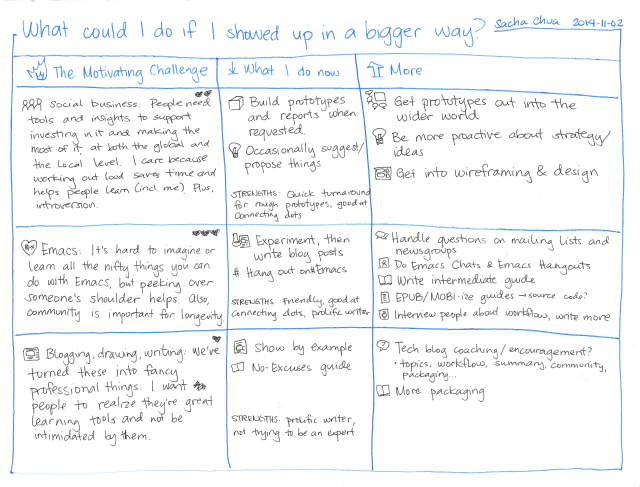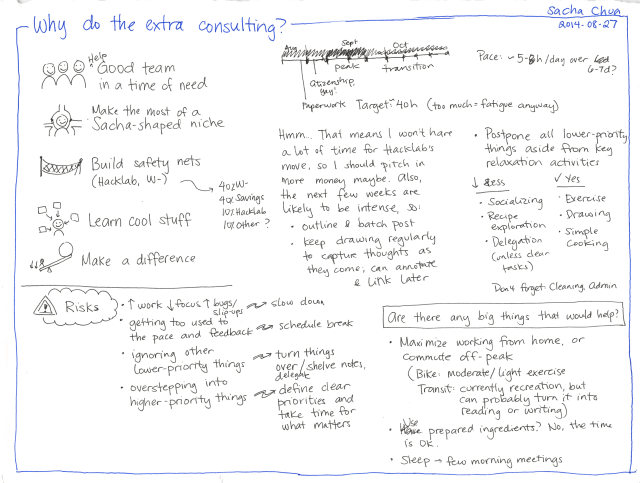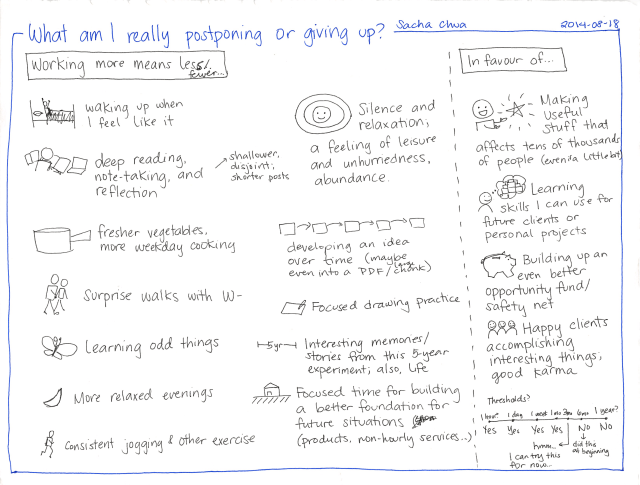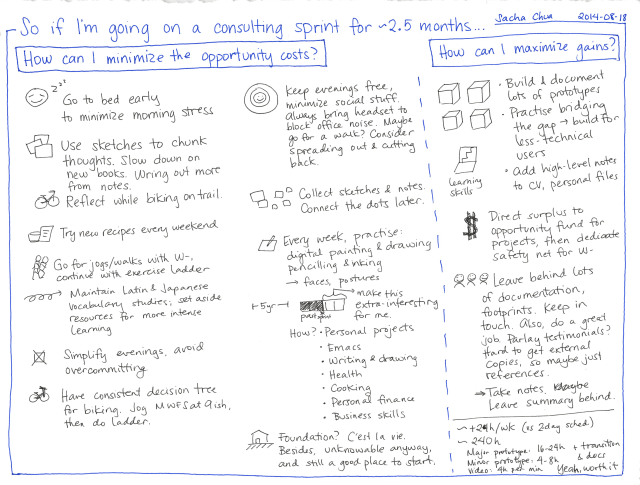Learning slack
Posted: - Modified: | experimentAmy Hoy's post “Don't write 1000 words a day” goes:
What would bring a person to ask, “How do you motivate yourself?” … This question presumes that You are not a single entity, but a split one: a cart driver, and a donkey.
The cart driver is trying to flog the donkey and the donkey is digging in its heels. If only the cart driver can figure out how to overcome the stubborn donkey, Writing Will Ensue.
This reminded me of what I wrote about word counts and chunks, and thinking in terms of ideas instead of an arbitrary number of words. I want to learn at least one new thing or share at least one thought, whether that takes lots of words or just a few. My goal isn't to write, and it definitely isn't to Become a Writer. It's to learn, and I learn so that I can have more fun and live an awesome life. (You can see how everything fits into my evil plans. ;) )
On a different note, what Amy said also reminded me of this post I wrote in January 2014 about a conversation about writing, and reflections on taskmasters. I had resolved to let myself explore, instead of setting myself firm deadlines and concrete goals like all the productivity and entrepreneurship books tell you to do. I coded whenever I felt like it and didn't when I didn't. I reduced my consulting hours and spent more time writing, reading, and drawing. I went to parks with friends and hung out in the afternoon sun.
This is the story so far of my 5-year experiment:
- Hitting the ground running, working more than I did before, trying out lots of different business ideas
- Settling into a good rhythm, gradually decreasing commitments
- Now, prioritizing flexibility, enjoying the journey
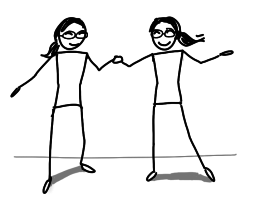 Slack turns out to be a powerful thing. These past few weeks I've been very much under the weather, almost out-sleeping our cats. It was great to be able to ride it out without getting too annoyed or frustrated at the changes in my energy. I told my clients about my limited availability. I turned over all my commitments to other people. I gave myself even more permission to nap, to read, to relax. Occasionally, as life permitted, I worked on little things that could help people (but whose absence wouldn't hurt them). The world went on, and it was wonderful.
Slack turns out to be a powerful thing. These past few weeks I've been very much under the weather, almost out-sleeping our cats. It was great to be able to ride it out without getting too annoyed or frustrated at the changes in my energy. I told my clients about my limited availability. I turned over all my commitments to other people. I gave myself even more permission to nap, to read, to relax. Occasionally, as life permitted, I worked on little things that could help people (but whose absence wouldn't hurt them). The world went on, and it was wonderful.
I found out that when I gave myself permission to do anything I wanted, my decisions worked out mostly like this:
- Am I tired? If so, sleep.
- Am I fuzzy-brained? If so, consider taking a nap, or relax with some light reading.
- Do I feel semi-okay, and am I tired of reading? If so, practise drawing by copying other people's sketches.
- Am I somewhat coherent? If so, write.
- Do I feel alert and logical? If so, code.
And even spending almost half the time in bed, I still feel pretty good about the things I did manage to do:
- pick up recursive SQL queries and use them to create even better Tableau reports for my consulting client
- coach team members on development and analytics
- write a lot, and get better at working with outlines
- work on Quantified Awesome a little bit
- play around with Emacs and swap tips with other people
Things are slowly returning to normal. I can feel my mind becoming more alert, although it's still a little squirrelly from the protocol I need to follow. But it was great to be able to explore what trusting myself more with time looks like.
I'm so glad that I could do something like this instead of having to force myself through the usual routines, or pretend to energy I didn't have, or meet commitments I couldn't shake. It's a privilege and other people get through a lot worse. But hey, I'm here, so I might as well learn from what I can learn and share what I can share.
I'm not quite a slacker, but the word intrigues me. It might be interesting to be a slack-er, a master of slack, someone who knows how to create just the right kind of balance between tension and space, someone who can pay attention to the shifts in energy. If there's just enough play, you can feel where things want to take you. If you pull too hard, you lose that sense. If you hold too loosely, you don't pick up that difference either. Oh! Perhaps like dance.
I like the tips in J. B. Rainsberger's “Productivity for the Depressed” (handy even if you aren't). In particular, I resonate with:
- Either work and feel terrible or avoid work and feel good, but don’t let yourself avoid work while feeling terrible.
- Go with your energy.
- Avoid commitments. Refuse commitments when others try to force them on you. Look for self-contained opportunities to contribute where completing the work helps people but not completing the work does not hurt them.
- Look for any opportunity to build more slack into your life: money slack, time slack or energy slack.
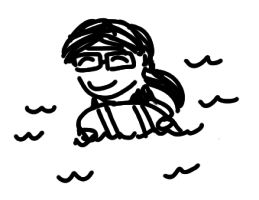 Another metaphor here that makes sense to me: energy comes in waves, and you can ride them. For me, it's not just a single channel, not just a single beach to surf to. I can go lots of different ways. I don't have to work with just the big waves either. I can take the small ones for a little bit of adventure. (Oh, that reminds me of this March 2014 post about having a buffet of goals, and this Oct 2014 post about wandering through parks.)
Another metaphor here that makes sense to me: energy comes in waves, and you can ride them. For me, it's not just a single channel, not just a single beach to surf to. I can go lots of different ways. I don't have to work with just the big waves either. I can take the small ones for a little bit of adventure. (Oh, that reminds me of this March 2014 post about having a buffet of goals, and this Oct 2014 post about wandering through parks.)
Smartcuts: How Hackers, Innovators, and Icons Accelerate Success (Shane Snow, 2014; Amazon affiliate link) has a chapter on catching waves. The best surfers look at patterns and decide things like:
- Where should you position yourself to catch a good wave?
- Which wave will you catch? (It doesn't have to be the next one that's coming.)
- How can you paddle in order to catch it?
- What will you do with it?
You can't force a wave. (Okay, maybe you can engineer one.) If you're out there, you just have to learn how to read the energy. There are waves going in different directions, and sometimes they combine to make pretty good ones. Even if nothing's coming for a bit, you can still enjoy the view.
I'm reminded of how my sister kept a close eye on weather forecasts back when she was into the scene. Storms can lead to good surf, and calms can have their own charm. In life, too.
I like those metaphors. Not taskmaster/slave, but dancer, surfer. Let's see where this goes.
(In real life, I was terrible at surfing: never keen on water, and with too much of a healthy appreciation for possibly poisonous or otherwise dangerous things in the sea. But that's why metaphors are metaphors.)

